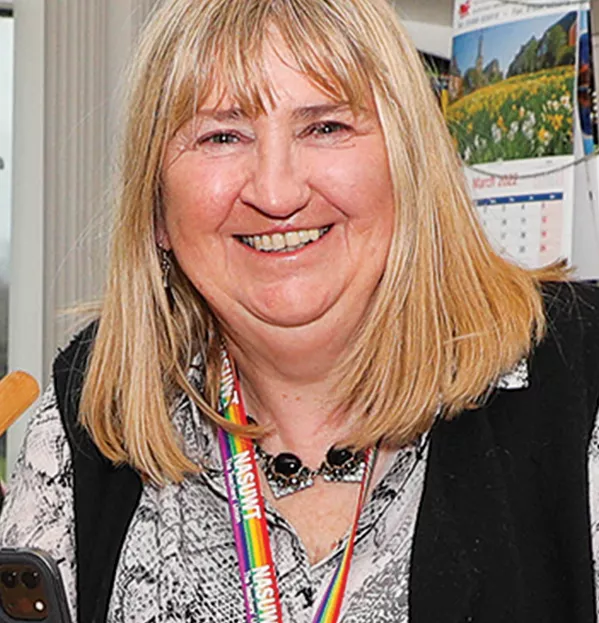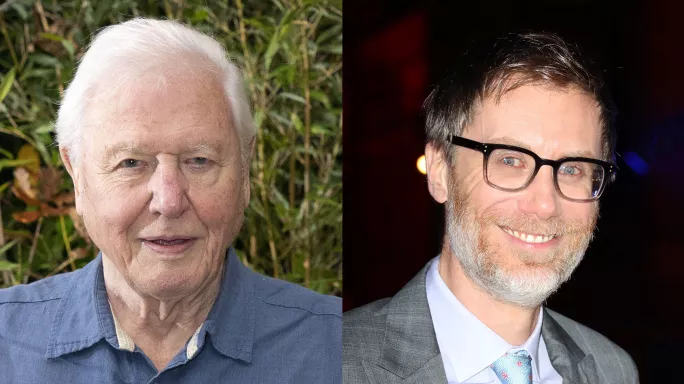Tes’ 10 questions with... Angela Butler

Angela Butler is the new president of the NASUWT teaching union, and a special educational needs and disabilities teacher.
She speaks to Tes about how, for her, union work and teaching have always been on a parallel path, about the satisfaction of helping pupils gain confidence in school and her frustration at the subjects barred to her at school in the 1970s because of her gender.
Who was your most memorable teacher and why?
I can remember virtually every teacher I’ve ever had. I suppose there are two that were really influential for me. One was my chemistry teacher Dewi Richards. He saw my potential and I followed in his footsteps and went to Swansea University where he’d been to study chemistry, and then I became a chemistry teacher!
Another secondary school teacher, Peter Rees, didn’t actually teach me but when I went back to do my two weeks observation before teacher training, he taught special needs and was a NASUWT rep. He told me that if I was going to be a student teacher, I should sign myself up to a union.
What were the best and worst things about your time in school?
There were two pretty bad things about school in the 1970s. Personally, for me, it was the fact that I wasn’t allowed to do certain subjects because I was a girl: I couldn’t do tech drawing. Both my brothers are civil engineers and they had taken sciences and tech drawing (as it was called in those days) and I wasn’t allowed to do that. I had to do sewing and cooking and that wasn’t something I liked. So that discrimination frustrated me.
Another thing, and I didn’t experience it but I saw it a lot, was corporal punishment. It was a time in schools when the cane was regularly used.
In terms of the best things: I got a love of learning; I have always had a love of learning. I enjoyed that I was in a comprehensive school in South Wales. My family were working class, but I sat next to one of my closest friends in school who was a doctor’s son: everyone was equal, and everybody was given the same opportunity to succeed.
Why do you work in education?
It’s because I like young people; I like watching them grow, develop and thrive. When I became a special needs teacher, I think I saw my true vocation. I support dyslexic pupils. I was interested in it, so had the opportunity to retrain. I was working with youngsters who are intelligent but have a barrier with language and the written word...but we judge them at 16 by written assessment, which will affect their lives and their life chances. I think all the young people I teach have a special gift, it’s about unlocking that and making the most of their potential…to flourish in our world, which is absolutely governed by the written word.
What are the proudest moments of your career and what do you regret?
My proudest moment, the pinnacle of my lifetime achievement in education is becoming president of NASUWT, because I chose not to follow a leadership route within school, although I was head of Year 7 for over 30 years.
On a yearly basis, seeing students come in scared…then, at the end of that year, seeing them as confident youngsters able to survive in high school. I really enjoy working with students at that time of their life when they’re really trying to make sense of who they are. I think it’s very rewarding and I think we’re privileged to be able to guide them on that path.
I’ve been very blessed. When I got the job here in Newtown in Powys, I didn’t know where it was. But I came here, and I found some lovely supportive colleagues. I found a niche for myself. There was nothing I regretted, although I did apply to go back down to South Wales because I thought that was the centre of the universe. But then a couple of years later, a young history teacher joined the staff and he ended up being my husband! There’s nothing I would do differently. You get your ups and downs…but if I had to do it again, I would.

Who would you have in your staffroom?
David Attenborough. I use a lot of his work in part of my teaching. He’s such a natural teacher and he’s so enthusiastic in his message. If he could be in my staff room, it would enrich not only my experience but also the experience of the students. And then from a personal point of view, when I go into the staff room, I want to have a bit of a joke with my colleagues. So if Stephen Merchant was a permanent fixture in my staff room, that would be an absolute destresser.
When I was in Bangor doing my dyslexia training, there was an academic there called Professor Miles who was absolutely world-class, and I was honoured to be able to go and study with him. He spoke about children with dyslexia…and he changed my life.
What are the best and worst aspects of our school system?
Underfunding. Whether you’re in Wales, England, Scotland or Northern Ireland, underfunding is the number one problem. Education is, and should, be expensive because we’re investing in the future.
In Wales, the worst part of the school system is the local management of schools. But in Powys that only really affected the high schools…they took control of the budgets but all the primary schools - because they were small - were under the local authority. But now I am frustrated by the fact that you’ve got this layer in education…that can sometimes conflict with what the local authority wants. Sometimes it can conflict in Wales with what the Welsh government wants.
The good thing, personally, for me, is we’ve got comprehensive education and that is, I believe, the best setting for young people - that melting pot is what I believe enables young people to thrive.
If you became education secretary tomorrow, what would you do?
I would make sure I respected teachers; I’d make sure I respected the fact that we have worked all the way through this pandemic. We have absolutely been the fourth emergency service. Respect us by supporting us, by paying us properly, by giving us the career structure we want, by protecting us from initiatives that are just there to be self-serving and from abuse on social media, malicious allegations and some areas of the press.
What will our schools be like 30 years from now?
I think, in another generation, exams won’t be as we know them. There won’t be an emphasis on written paper exams. There will be far less emphasis on exams in terms of what we’re used to as exams: the two hours in a hall.
Obviously, technology. We’ve had such a pedagogical change in using technology in the last two years. But actually, lots of it is really good. I don’t think that you can ever replace that personal interaction…but you don’t necessarily need to do it all day every day.
Who has made the biggest difference to education in the last 12 months?
In Powys, we have now got a new director of education called Lynette Lovell and not long ago she was a headteacher in a local primary school. So she’s, as we say, “homegrown”. She went to school in Powys, she taught in Powys, she was a headteacher in Powys and now she’s director of education. And I think she has made a huge difference to education there. She listens to teachers, and she listens to parents.
What are the most important lessons you have learned from doing this job?
Patience, patience, patience, and also inclusion.
I sort of had two careers. As a chemistry teacher, I was fixated on subject knowledge and getting students through hoops of exams. On the flip side, I then became involved with young people who, a generation ago, would have been put in a class just on literacy ability because they can’t read and write. Whereas now they’re in class because of their non-verbal potential.
That inclusion policy has been very rewarding. Determination, resilience…that’s what I try and teach my pupils and instil with them. You’ve got to be resilient in life and you’ve got to pick yourself up, dust yourself down and start all over again. You’ve also got to keep a sense of humour at all times and find joy in everything.
You need a Tes subscription to read this article
Subscribe now to read this article and get other subscriber-only content:
- Unlimited access to all Tes magazine content
- Exclusive subscriber-only stories
- Award-winning email newsletters
Already a subscriber? Log in
You need a subscription to read this article
Subscribe now to read this article and get other subscriber-only content, including:
- Unlimited access to all Tes magazine content
- Exclusive subscriber-only stories
- Award-winning email newsletters
topics in this article



